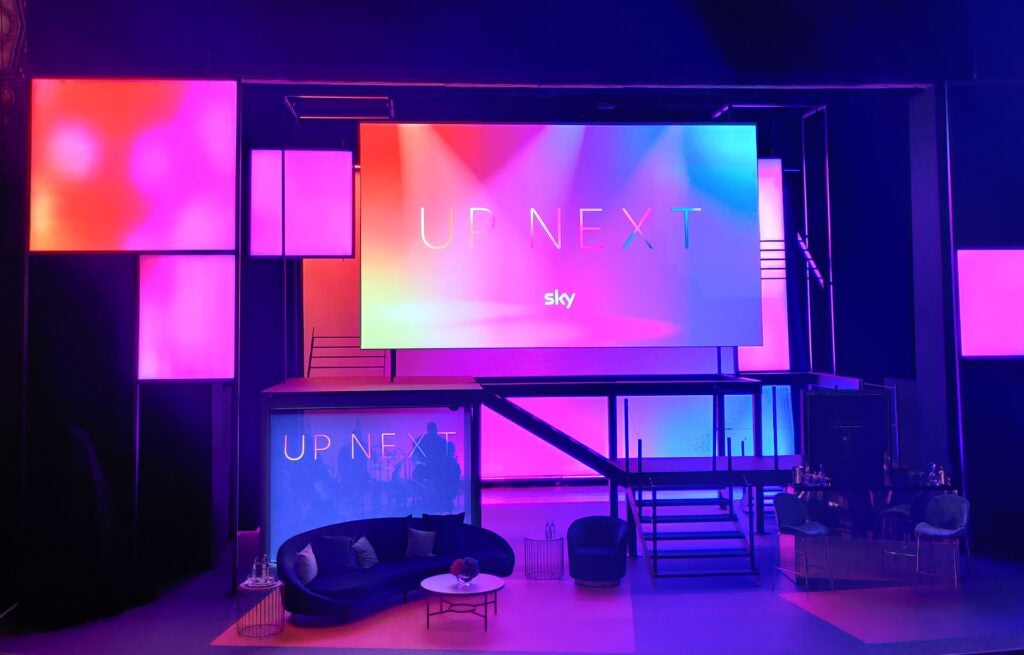
OPINION: Sky revealed its 2022 content line-up at its Up Next event and it had me wondering about where the UK broadcaster sees itself in this ever-changing media landscape.
The event, as you’d expect, was rather glitzy to the point where I wondered whether it was a mistake to invite me, a hoodie/combat trouser combo wearing journo, to the event.
There was a parade of stars on stage chatting about the shows coming to Sky (or already available), and while that can veer into the self-congratulatory, what struck a chord weren’t the creative folk in view but what’s going on behind the scenes.

It was announced there will be 200 Sky Original shows launching this year, 60% more than in 2021, while Sky has also set up shop at Elstree studios, ramping up its recruitment drive with the view of going online later in 2022. Sky says the 13 studios under Elstree’s roof will enable £3bn worth of production investment over the next five years. These figures are important as they highlight the impact of streaming on production and hunger for more content.
Original programming for TV has seemingly never been more important, despite being around since, well, the birth of TV. The money media conglomerates are throwing into creating new programming – if you can really call all of it new considering the amount of re-dos, remakes and re-imaginings – raise eyebrows in Roger Moore-esque fashion.
Netflix is estimated to spend $17bn (or maybe less after its recent travails) this year. Disney expected to spend $33bn across its portfolio, while Warner Discovery will part with $20bn. They’re not messing about and the figures quoted show there’s plenty of risk. Disney hasn’t actually made a profit on Disney+ yet…
And the money these studios are pumping in aren’t going to services they don’t own, which is going to affect Sky. I’d wager US content from Warner/HBO is on slightly shaky ground with that deal finishing in 2025. After its recent culling of shows on The CW Network, I’d expect Warner Discovery to put its eggs into one HBO-shaped basket and export the Max service to the UK.
With BT Sport in the process on being eaten up by Discovery, becoming a huge rival to Sky Sports in the process, Liberty Media will likely have another look at F1 when its deal expires in 2024. Sky could be feeling the heat.
It’s the result of licensed content – or the original ‘original’ content – becoming a strategic play to draw viewers. Netflix has suffered the most, having had Star Trek: Discovery pulled from its grasp to open the path for Paramount+‘s international launch, while in the US it has seen the likes of Friends, The Big Bang Theory and The Office tractor-beamed back to the mothership(s). Sky wouldn’t want to be in this position.
And so Sky needs to make hay while the sun shines with its current deals, while also putting its pieces in place for the future. It isn’t a broadcaster in the traditional sense anymore, with many fingers in many pies from conception of content to the delivery of it. While recent moves has seen them become an aggregator of content on the Sky Q and Glass platforms, I don’t think they can depend – at least in the future – on others to funnel hits directly to them like Game of Thrones and Succession. They need to make their own water cooler hits, like Gangs of London, and with US media giant Comcast behind them, they have the resources to do so.
But all this blabbering leads me back to a point I’ve made in previous columns. That Sky’s weapon in the streaming wars could be the Stream puck, the most interesting aspect of Sky Glass. Creating content is one thing, how people enjoy it is another. With the increase in programming and the investment Sky is making; if the Stream puck is priced right, it could open Sky’s growing library to a wider audience.
It always annoyed me when I was growing up that Sky would – in my eyes – ‘steal’ the likes of 24, Lost and Mad Men after a few seasons of being on terrestrial TV, disappearing behind a paywall. But now, imagine you had an affordable way into Sky’s service and could watch it on any screen? That might see Sky make its way through these increasingly choppy waters of the streaming market.






